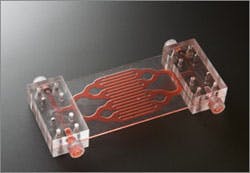Landmark annual event celebrates multidisciplinary efforts that deliver leading edge technologies
Wyss Institute Founding Director Don Ingber, M.D., Ph.D., will deliver the 2014 Graeme Clark Oration in Melbourne at Australia’s most prestigious public science event on June 5th. The event celebrates game-changing medical technologies and advances made possible by breaking down the barriers between scientific disciplines.

"This is an incredibly exciting time in healthcare, which has seen tremendous advances because of a relatively new understanding that solving the world’s most pressing challenges requires a cross-disciplinary approach," said Ingber. "The Wyss Institute is a great example of this approach in action in the burgeoning field of biologically inspired engineering, and I am deeply honored with the opportunity to share some of our successes at this esteemed event."
The event is expected to draw more than 1200 attendees, including the Governor of Victoria, The Honorable Alex Chernov AC QC.
At the Wyss Institute, academia interfaces directly with industry in a new translation-focused model of collaboration that is developing new bioinspired devices and materials at a much faster pace than is possible in the traditional academic setting. Since its founding just over five years ago, the Institute has filed more than750 patent applications, developed scores of product development-focused collaborations with industry, enabled multiple new startup companies, and initiated two human clinical trials. Its portfolio integrates cross-platform work in microfluidics, robotics, materials science, synthetic biology, nanotechnology, tissue engineering and more—and has led to an implantable cancer vaccine, nanotherapeutics that target clotted vessels, a spleen-like blood-cleansing device to fight sepsis, vibrating shoe insoles designed to restore balance in the elderly and more.

During his address, entitled "The Next Technology Wave: Biologically Inspired Engineering," Ingber will highlight many of these technologies, including his pioneering work on organs-on-chips. These are microfluidic devices fabricated using microchip manufacturing techniques that contain hollow chambers lined by living human cells which recapitulate organ-level structure and functions. Widely recognized for their potential to replace animal testing for drug development and discovery, Ingber’s team is in the process of integrating about ten organ chips into a "human body-on-a-chip."
The Graeme Clark Oration is a free public lecture established in 2008 to honor Laureate Professor Emeritus Graeme Clark AC, inventor of the bionic ear. Ingber, who is also the Judah Folkman Professor of Vascular Biology at Harvard Medical School and Boston Children’s Hospital, and Professor of Bioengineering at the Harvard School of Engineering and Applied Sciences, joins an eminent list of previous speakers including Craig Venter, a biologist and entrepreneur who led the private sector bid in the race to sequence the complete human genome; Terry Sejnowski, a pioneer in computational neuroscience, and a key adviser to the U.S. Government on its recently announced BRAIN initiative; and Graeme Clark himself, who left practice as a doctor to engineer the bionic ear.

"It is wonderful to have someone of Dr. Ingber’s reputation and inspired leadership deliver this year’s Oration," Clark said. "It is exciting and timely to have the critical role of convergence in delivering new breakthroughs discussed and better understood. While challenges remain, I believe the future is very bright for scientific research aimed at improving human health and well-being."
The Oration event includes a strong outreach focus as well. Before the evening Oration, Ingber will have the opportunity to deliver a special talk for secondary school students and their teachers, with a dedicated Q&A session. He will encourage the students to participate in a video competition — a new element to this year’s Oration event — for which the winner receives a 3D printer.
Held at the Melbourne Convention Center, the Oration is hosted by the ICT for Life Sciences Forum, a collaboration between Melbourne’s leading medical research institutes, hospitals and universities.
For more information about the Wyss Institute’s latest technologies, please visit http://wyss.harvard.edu/viewpage/our-work/our-work.